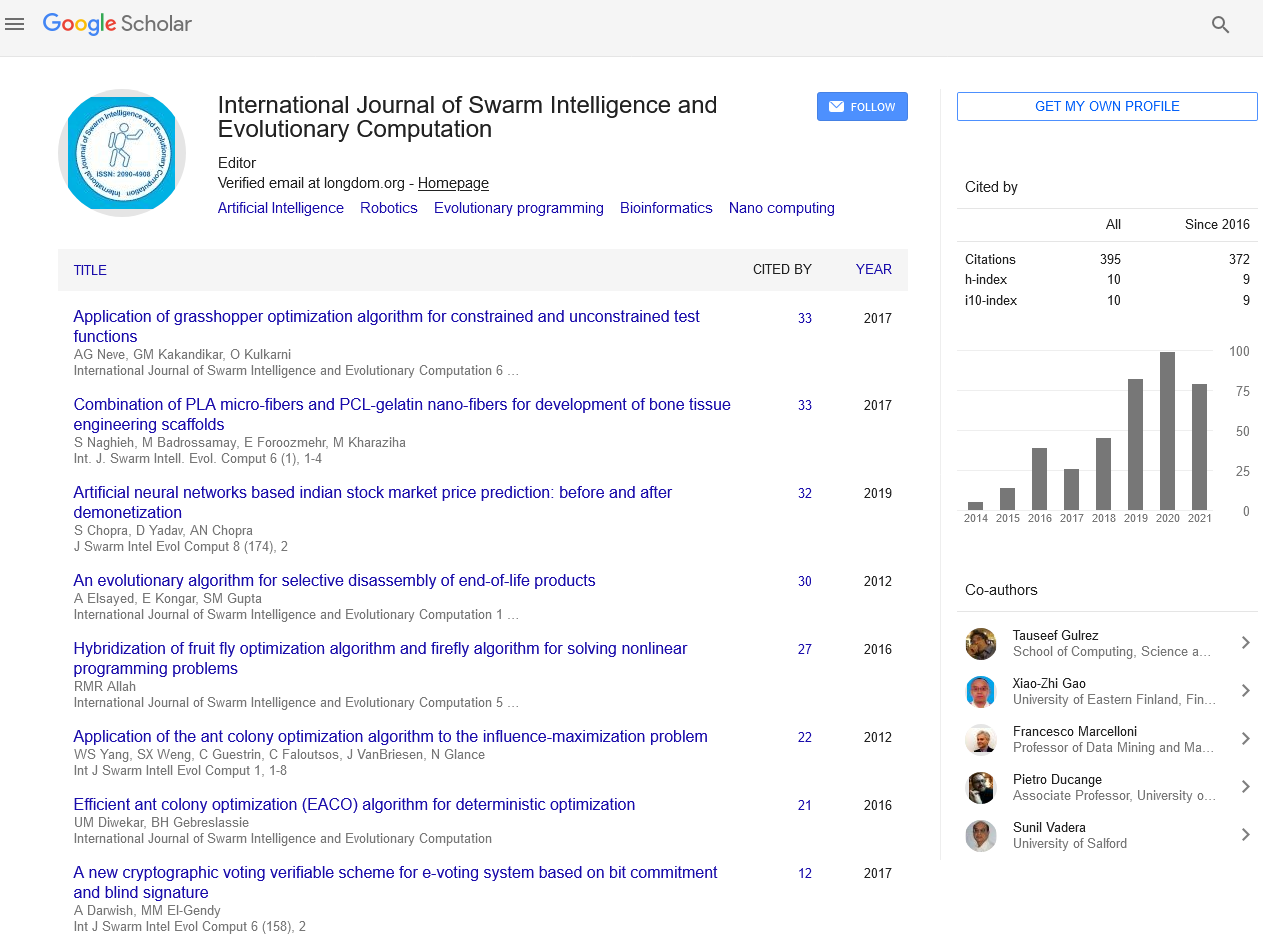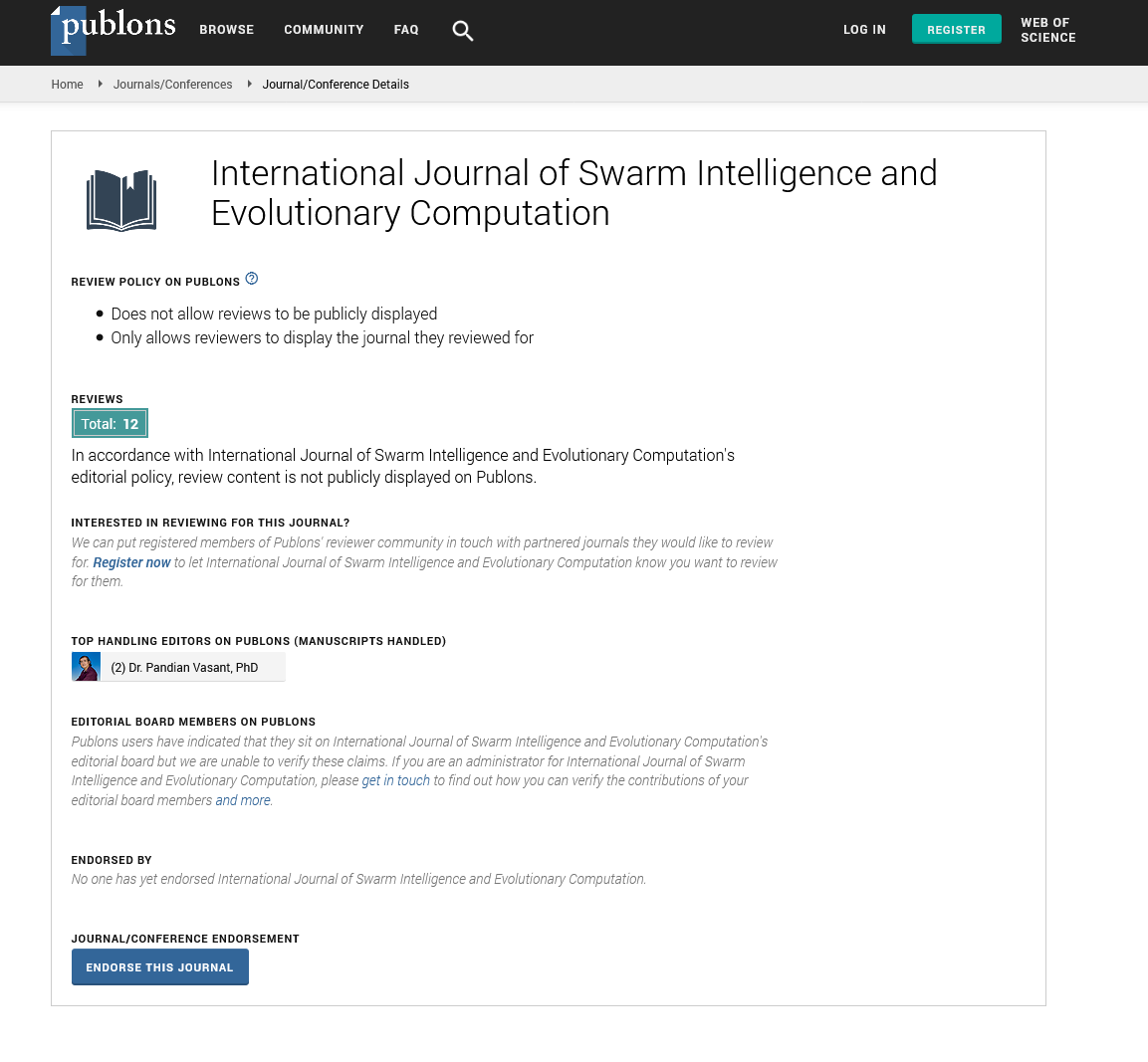Indexed In
- Genamics JournalSeek
- RefSeek
- Hamdard University
- EBSCO A-Z
- OCLC- WorldCat
- Publons
- Euro Pub
- Google Scholar
Useful Links
Share This Page
Journal Flyer

Open Access Journals
- Agri and Aquaculture
- Biochemistry
- Bioinformatics & Systems Biology
- Business & Management
- Chemistry
- Clinical Sciences
- Engineering
- Food & Nutrition
- General Science
- Genetics & Molecular Biology
- Immunology & Microbiology
- Medical Sciences
- Neuroscience & Psychology
- Nursing & Health Care
- Pharmaceutical Sciences
Perspective - (2025) Volume 14, Issue 1
The Converging Horizon: Hybrid Swarm AI Systems and Their Transformative Real-World Applications
Naokazu Chen*Received: 12-Feb-2025, Manuscript No. SIEC-25-28700 ; Editor assigned: 14-Feb-2025, Pre QC No. SIEC-25-28700 (PQ); Reviewed: 23-Feb-2025, QC No. SIEC-25-28700 ; Revised: 07-Mar-2025, Manuscript No. SIEC-25-28700 (R); Published: 14-Mar-2025, DOI: 10.35248/2090-4908.24.14.417
Description
The trajectory of both Swarm Intelligence and Artificial Intelligence points increasingly towards their synergistic integration, paving the way for the development of sophisticated hybrid systems that leverage the unique strengths of each field. These future Swarm AI systems will harness the inherent robustness, adaptability, and scalability of SI in navigating complex and dynamic environments, while simultaneously leveraging the analytical power, learning capabilities, and goal-orientedness of AI to guide and optimize collective behavior towards specific objectives. This convergence promises to unlock a wave of transformative applications across a diverse range of domains, impacting nearly every aspect of our lives.
In the realm of robotics, we can anticipate the deployment of intelligent swarms of autonomous robots, guided by sophisticated AI algorithms, to perform tasks that are currently challenging or impossible for individual robots or human teams. These applications could include large-scale search and rescue operations in disaster zones, comprehensive environmental monitoring and data collection in remote or hazardous areas, and the efficient inspection and maintenance of complex infrastructure such as bridges, pipelines, and wind farms. In the logistics and transportation sectors, AI-powered swarm algorithms could revolutionize traffic flow management in congested urban environments, optimize warehouse operations and inventory management in vast distribution centers, and coordinate fleets of autonomous vehicles for efficient and dynamic delivery services. The healthcare industry stands to be significantly impacted by Swarm AI, with the potential for swarms of nanobots, precisely controlled by AI, to deliver targeted therapies at the cellular level, perform minimally invasive surgical procedures with unprecedented accuracy, and even assist in complex diagnostic tasks. Beyond these specific examples, the principles of Swarm AI could be applied to optimize energy consumption in smart grids, manage resources in large-scale distributed computing systems, and even develop more resilient and adaptive financial trading algorithms.
The realization of these transformative Swarm AI applications will necessitate significant advancements in several key areas, including robust multi-agent communication protocols, sophisticated distributed sensing and perception capabilities, and the development of control algorithms that can effectively manage the behavior of large-scale autonomous systems. Furthermore, as these systems become more integrated into our daily lives, proactively addressing the ethical and societal implications of deploying highly autonomous Swarm AI systems will be of paramount importance. This includes establishing clear regulatory frameworks, ensuring transparency and accountability in system design and operation, and fostering public understanding and trust in these powerful technologies. Despite the challenges that lie ahead, the potential benefits of combining the collective intelligence of swarms with the analytical power of AI are immense, offering the promise of solving some of the world's most complex problems and ushering in a new era of intelligent automation and innovation.
Hybrid swarm AI systems aim to overcome the limitations of pure swarm intelligence by combining decentralized, self-organizing agents with centralized control mechanisms. In these hybrid systems, the swarm's autonomous agents retain their ability to interact locally and self-organize in real-time, but higher-level coordination and strategic oversight are provided by a centralized control layer, often utilizing traditional AI approaches such as machine learning, optimization algorithms, or reinforcement learning.
Hybrid swarm AI systems represent a transformative evolution in artificial intelligence, blending the best aspects of decentralized swarm intelligence with the strategic oversight of centralized control. This convergence opens up new possibilities for tackling complex, dynamic challenges across a wide range of fields, from autonomous robotics and smart cities to agriculture and healthcare. By combining local adaptability with high-level optimization, hybrid swarm AI systems are poised to enhance the efficiency, resilience, and scalability of AI applications, pushing the boundaries of what is possible in the real world. As this technology continues to mature, it will likely unlock even more innovative solutions that can address some of society's most pressing challenges. The horizon of hybrid swarm AI is indeed converging, offering a promising glimpse into the future of intelligent systems.
Citation: Chen N (2025). The Converging Horizon: Hybrid Swarm AI Systems and Their Transformative Real-World Applications. Int J Swarm Evol Comput. 14:417
Copyright: © 2025 Chen N. This is an open-access article distributed under the terms of the Creative Commons Attribution License, which permits unrestricted use, distribution and reproduction in any medium, provided the original author and source are credited.


